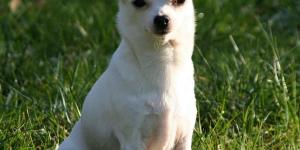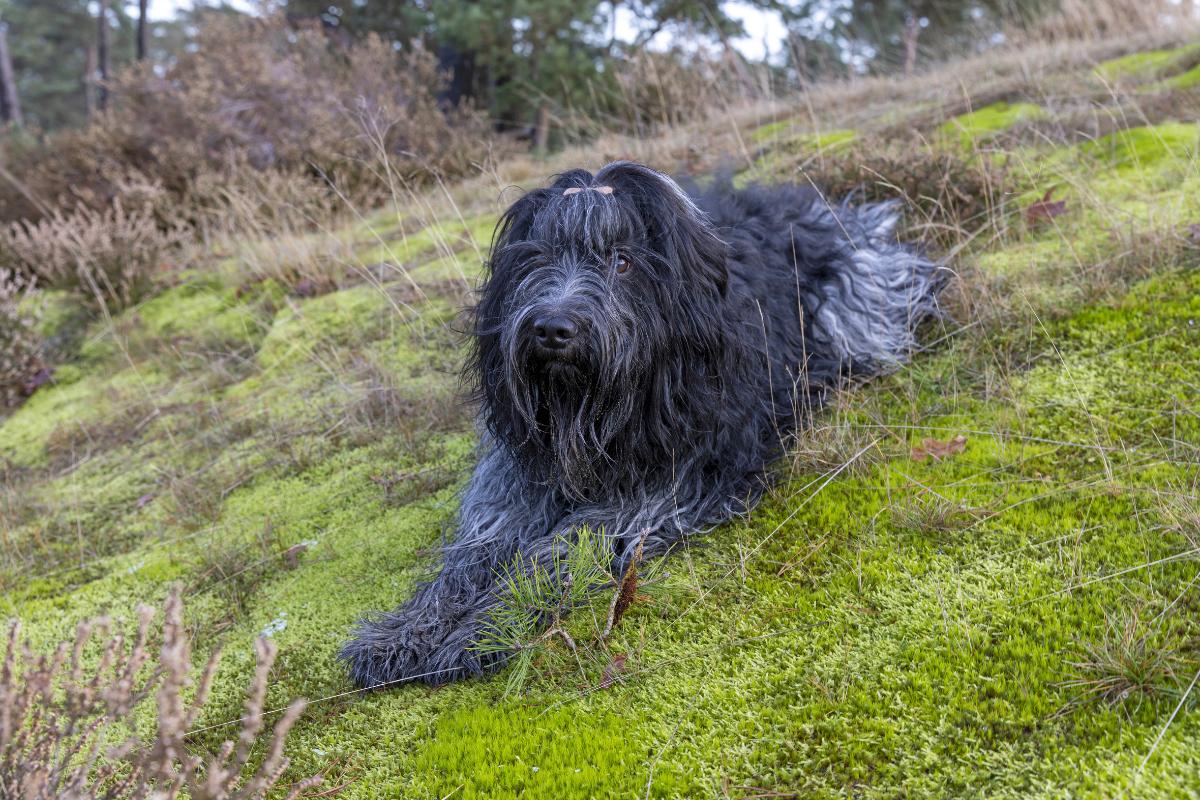Schapendoes or Dutch Sheepdog

The Schapendoes, is a dog native to the Netherlands that was traditionally used as a herding dog and general farm dog due to its agility and intelligence. Over the years, the Schapendoes has become an excellent family dog thanks to its cheerful and affectionate nature. They also have a strong desire to please, are easy to train and get along well with children and other pets.
If you want to learn more about the Schapendoes dog breed, do not miss the following AnimalWised animal file, in which we will talk about the main characteristics of this dog, also known as the Dutch Sheepdog.
- Europe
- Netherlands
- Group I
- 5-14
- 14-18
- 18-22
- 22-27
- 27-31
- More than 31
- 2-7
- 7-22
- 22-55
- 55-100
- 100-220
- 8-10
- 10-12
- 12-14
- 15-20
- Low
- Meidum
- High
Origin of the Schapendoes
The origin of the Schapendoes is unclear. The breed is thought to have existed throughout the Netherlands for centuries. Since its origins, it has been a shepherd dog used to guard flocks of sheep and as a farm dog, as it has great endurance, speed, and agility.
It was a very popular breed in the late 19th and early 20th centuries, but was on the verge of extinction during the World War II. With the end of the war in 1945 began a serious development of this breed. In 1947 the Schapendoes Breeders Association of the Netherlands was founded. In fact, the modern day breed descends from the few survivors.
If you want to learn more about sheepdogs, you should not miss the following article, in which we explain the different types of sheepdogs as well as their main characteristics.
Characteristics of the Schapendoes
The Dutch Schapendoes is a medium-sized, long-haired dog. Overall, the dog has a balanced and light build. On average, they can weight between 26 and 55 pounds (ca. 12 to 25 kg). Their height varies from 16 to 20 inches (ca. 40 to 51 cm). The breed is built for springy movements, which benefits it as a herding dog.
The most notable characteristics of the Schapendoes breed standard are the following:
- The head is luxuriantly hairy, giving the impression that it is much larger than it actually is. The fronto-nasal depression is also well-developed, although not steep.
- The eyes are large, round, and brown and located rather frontally on the face. Their look is open, loyal, and lively and very characteristic of this breed.
- The ears are set rather high and hang on both sides of the head. They have long fur and are quite mobile.
- The tail is long and well covered with hair. Its position varies according to the condition of the animal. When the dog is resting, the tail hangs very low. If trotting, the dog carries it quite high, swinging from side to side. When galloping, the dog carries the tail horizontally, which serves to redirect the jump.
Schapendoes dog breed coat colors
This is undoubtedly one of the most striking features of the Schapendoe. It has long, wavy, dense and fine hair. They should have a whisker and a beard, as well as pronounced feathering on the backs of their legs and tails. In places where the coat is longer, it tends to form cords. The coat's colors ranges from white, black, gray, beige and chocolate brown. However, the most common shades range from gray to black.
Character of the Schapendoes
The Dutch Schapendoes is an intelligent, happy and lively dog that is usually always alert and vigilant. They are known for their friendly and spirited nature. They are not only a good sheepdog, but also an exceptional family dog. Furthermore, they know how to take the initiative and work independently. Likewise, they know how to remain calm when their needs are satisfied.
These dogs develop a strong sense of loyalty to their human family and enjoy spending time together. But remember that they are herding dogs that may try to corral children or other pets. In general, they are calm dogs and are not afraid of strangers.
People with active lifestyles, especially those who spend a lot of time outdoors, will find them excellent companions because of their active nature.
Care of the Schapendoes
Like any other breed, the Schapendoes needs basic care to stay healthy and live a happy and long life. Remember that they are a very active breed and require daily exercise. Grooming this breed is also relatively easy, but also requires some dedication. Below you will find the most basic care that this breed needs:
- Grooming: The coat of the Schapendoe should not be trimmed, as it has a protective and insulating function. To keep the coat healthy and free of tangles, you will need to brush it once a week. The dense coat of this breed is prone to matting, especially where it is feathered. The nails grow quickly, so they should be trimmed every month. The ears should be cleaned weekly, and the teeth brushed every 2-3 days.
- Exercise: The Schapendoes is a very active dog that requires daily exercise to stay physically and mentally healthy. Give your Schapendoes at least two hours of exercise a day to keep them happy and healthy. Long walks, running, biking, hiking and vigorous games of fetch are all ideal activities. If they do not get enough exercise, they can become excessively loud or even destructive in the house.
- Diet: Schapendoes should be fed a high-quality dog food, whether commercially produced or home-prepared with your veterinarian's approval. Any diet should be appropriate to the dog's age (puppy, adult, or senior). It is important to watch your dog's calorie consumption and weight level because some dogs of this breed are prone to becoming overweight.
As mentioned earlier, this breed has a lot of energy and being able to exercise is key to developing a healthy, happy breed.
Training of the Schapendoes
Schapendos are easy to educate. Schapendos like to learn willingly, but they can also have an independent streak. It is an intelligent, docile breed with a good memory. They obey easily when trained from a young age with consistent, firm methods and positive reinforcement. To help Schapendos learn basic commands and new tricks, keep training sessions short and fun and use motivational tools like treats and favorite toys.
Although this breed does well with strangers and other dogs, socialization is important for all breeds, including Schapendos. Start exposing these dogs to new people, pets, and places early, so they can develop into well-adjusted pets.
Health of the Schapendoes
The majority of Schapendoes are healthy dogs. Their average life expectancy is around 13 years. However, due to poor breeding practices, some breeds are prone to certain genetic health problems. This does not mean that every dog in that breed will develop these diseases; it just means that they are at increased risk. Some of these health issues are:
- Progressive retinal atrophy: It is a hereditary disease, and affected dogs usually do not show symptoms until adulthood. The term progressive retinal atrophy refers to a group of genetic diseases characterized by bilateral degeneration of the retina, leading to progressive vision loss culminating in blindness.
- Hip dysplasia: In dogs, hip dysplasia leads to a loosening of the hip joint during the growth phase, causing pain and dysfunction. The cartilage and bones of the hip begin to wear away as the dog grows. Over time, this leads to arthritis, muscle atrophy and limited mobility.
- Obesity: Schapendoes have a large appetite and tend to gain weight easily. As with humans, obesity can lead to other health problems in dogs. If you notice that your dog tends to gain weight, you'll need to limit treats, make sure your dog gets enough exercise, and divide daily food portions into regular meals rather than leaving food sitting around all the time.
Where to adopt a Schapendoes?
The Schapendoes is a dog that is rarely found outside its homeland, the Netherlands, as it is still a little known breed. For this reason, it can be somewhat complicated to find a specimen of this breed at animal welfare organizations in other countries.
If you are thinking of adding a Schapendoes to your family, we recommend that you contact the clubs of this breed or your local dog association. They can assist you in finding your future companion. In any case, remember that the breed is not the most important aspect when adding a dog to your family. It is much more important that you are able to take responsibility for the dog's care and that it fits your lifestyle.
If you are interested in adopting a dog and have not yet decided on a specific breed, continue reading this other article, where we talk about all the benefits of adopting a stray dog.
Schapendoes or Dutch Sheepdog photos














